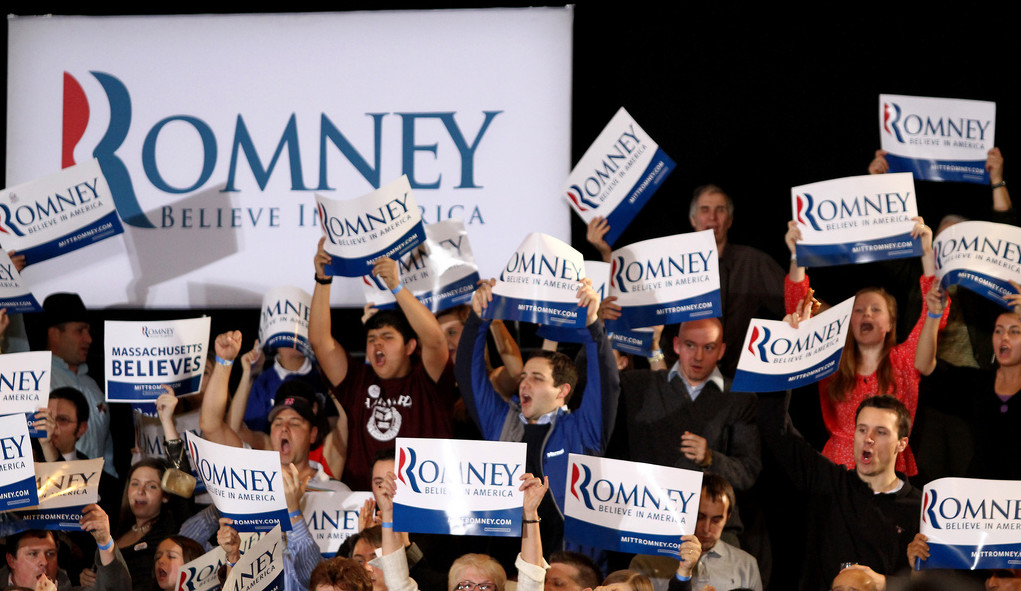I’m a political junkie, and even I’m sick of this campaign. If 2008 felt like we were watching history textbooks being written, 2012 has felt like an underground boxing match that’s gone the distance. Now we’re just waiting for the final bell.
John McCain positioned himself as a maverick during the 2008 campaign, but his maverick status was already in decline, and his campaign proved less daring than incompetent. Mitt Romney was in a better place to adopt the maverick mantle at the beginning of the 2012 campaign. He had identified as prochoice. He had worked with Massachusetts Democrats, and passed a landmark healthcare bill. He was not tied to polarizing social issues.
We all know how it turned out. Romney labeled himself as “severely conservative” and positioned himself as far to the right as pragmatically possible. The ascent of Herman Cain, Newt Gingrich, and Rick Santorum only served to push Romney even more rightward. This strategy worked, and Romney secured the nomination.
It’s hard to completely blame Romney for this strategy. Candidates from both parties shift their positions to appear more ideologically pure in the primaries in order to appeal to the committed party members who turn out in those primaries. But it’s also hard to not think about what could have been. If Romney had run on his record in Massachusetts. If he had stood up to the most conservative elements of his party and laid out a persuasive moderate vision. There would have been a risk of losing the nomination. But it would have positioned Romney much better for the general election, and may even have changed the national conversation.
For those liberals disenchanted with Obama, the argument for Romney is twofold: 1) at his core, he’s really the moderate from Massachusetts, and 2) he’ll be able to work with Congress more effectively than Obama. It’s hard to make a judgment on the first point. People take the lackluster moments in Romney’s campaign as proof that his heart is not with the conservative rhetoric he’s delivering. Or they see his changing positions as evidence of his pragmatism. Romney has forced voters to become psychiatrists attempting to divine the candidate’s true self.
The second argument, I believe, is much more convincing. Republicans in Congress have a kneejerk antipathy toward President Obama. The president proposed a healthcare bill drawn from ideas put forward by Richard Nixon, Bob Dole, the Heritage Foundation, and Romney’s own plan, but was strongly rebuffed. Formerly bipartisan topics like infrastructure and farm bills have become contentious. Much of the criticism of Obama has originated less with policy and more with a deep skepticism about the legitimacy of his entire presidency.
This hostility disappears in a Romney administration. If House Speaker John Boehner had been working with Romney rather than Obama, it’s probable that a grand bargain on tax and entitlement reform would have been seriously considered. It appears likely that Democrats will retain control of the Senate. Even if they don’t, Republicans will not have sixty votes, and Democrats could use their filibuster power to sway policy. President Romney could use his influence to craft compromises with Democrats and break Congressional gridlock. Polls indicate that many voters accept this narrative. Some liberals might accept that the best chance for fundamental reforms is in a Romney administration.
The problem with this argument is that it must be taken on faith. Romney, like all candidates, has made token references to bipartisanship. But there’s not much evidence to suggest he would be the kind of leader who would take the risks needed for bipartisan compromise. When, in a primary debate, he was offered a hypothetical grand bargain of $10 of spending cuts to $1 of tax hikes, Romney (like every other Republican candidate) said he would reject the deal. Research suggests that, contrary to popular wisdom, presidents carry out (or try to carry out) their campaign promises.
Maybe the best argument for Romney presidency, from a liberal perspective, is that it might not look that different from an Obama second term. Presidents have the most control over foreign and national security policy, and (as the third debate showed) both candidates mostly agree on those issues. Our political system was intentionally designed by the founders to make changing the status quo difficult. Political scientists have argued that the presidency is actually a much weaker office than commonly thought.
But if gridlock is inevitable, should liberals really take a chance on a Romney presidency? Some research argues that while divided government (which occurs when different parties control the different branches of government) causes gridlock, so does polarization inside the branches. And while Romney, as president, could use the bully pulpit the influence the national dialogue, he can’t force all the members of Congress to adopt more moderate positions. In addition, using this argument to support Romney is essentially rewarding Republicans for four years of intransigence.
Whoever is elected, the next four years will probably look a lot like the last four years. And while that sounds depressing, remember that for most of human history people didn’t have a say in who their leaders were. As Churchill said, “Democracy is the worst form of government, except for all those other forms that have been tried from time to time.” Happy Election Day.
